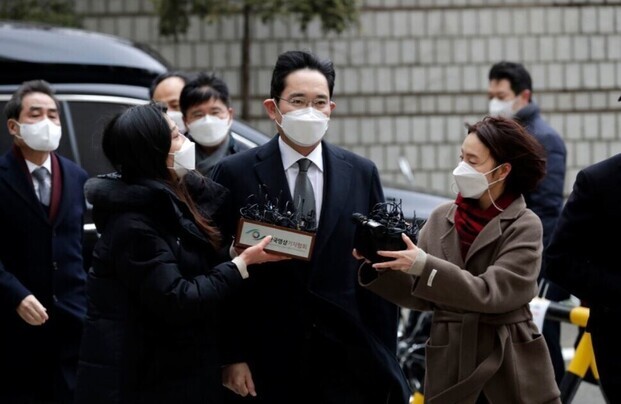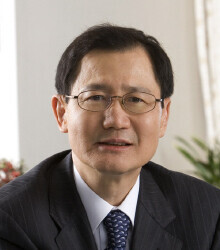hankyoreh
Links to other country sites 다른 나라 사이트 링크
S. Korean court ruling may make it harder for Lee Jae-yong to control Samsung while in prison

A company head who is convicted of embezzlement or breach of trust involving a sum of 500 million won (US$450,960) or more becomes ineligible to engage in management activity immediately upon finalizing their sentence, a South Korean court has ruled.
The decision means that such individuals cannot engage in management activity while in prison or serving a suspended sentence.
On this basis, observers are predicting that Samsung Electronics Vice Chairman Lee Jae-yong — who recently received a notification from the Ministry of Justice (MOJ) restricting his employment eligibility — will not only be unable to manage his company from behind bars but also have difficulty returning to his duties even if he is granted a MOJ waiver to do so during his restriction period.
According to an investigation by the Hankyoreh on Feb. 24, Judge Kim Guk-hyeon of the 7th administrative division of the Seoul Administrative Court issued a Feb. 18 ruling against Kumho Petrochemical Chairman Park Chan-koo, who was suing the MOJ to have an employment restriction against him overturned.
In November 2018, Park was sentenced to three years in prison suspended for five years on charges including breach of trust involving roughly 13 billion won (US$11.7 million). The following year, he attempted to return to his position as CEO of Kumho Petrochemical, only to face restrictions on his employment according to the Act on the Aggravated Punishment, etc. of Specific Economic Crimes.

Park filed suit in response, insisting that suspended sentences were not included in the employment restriction period. According to his argument, the employment restriction would only apply after the suspended sentence period was over.
In its ruling, the court rejected Park’s argument, concluding that the employment restriction “would need to start from the time of conviction in order to uphold the intent of the restriction and ensure its effectiveness.”
According to its judgment, the reason for having the employment restriction provision in the first place is to “protect related businesses and ensure a healthy economic order by preventing criminal actors from exercising influence over a certain period of time.” A suspended sentence should not be viewed any differently, the court said.
In the past, some business world observers had suggested convicted company heads might be able to take advantage of the law’s ambiguity to continue their management activities from prison.
They reasoned that the Aggravated Punishment Act only states that the employment restriction applies “five years after the execution of imprisonment [. . .] becomes final” or “two years after the period of the suspension of execution [. . .] is completed,” but does not indicate whether it applies while a sentence is being executed.
But the latest ruling undercuts that argument.
It also appears unlikely that Lee Jae-yong will continue managing Samsung from prison. He is currently serving a two-year, six-month sentence on charges of offering 8.6 billion won (US$7.7 million) in Samsung Electronics money as bribes to former President Park Geun-hye and her associate Choi Soon-sil (who has changed her name to Choi Seo-won). On Feb. 15, he received an employment restriction notice from the MOJ.
“As a figure with practical influence over Samsung, Lee Jae-yong is going to have difficulty returning to his duties with these employment restrictions, whether it’s as a non-registered executive or without compensation,” said Lee Chang-min, a professor of business administration at Hanyang University.
While Lee Jae-yong could in principle return to management following a review by the MOJ’s specific economic crimes management committee and approval by the Minister of Justice, the court’s ruling suggests the prospects for this are unlikely. The ruling in the Park Chan-koo case states that an applicant would need to provide “proof that they are irreplaceable to the duties that must be performed.”
“Samsung Electronics has been managed without serious issues despite several periods when Lee Jae-yong was absent,” noted Lee Chang-min.
“As a global company, Samsung Electronics would be admitting a risk the moment it declared Lee Jae-yong to be ‘irreplaceable.’ If anything, it could serve as a factor creating uncertainty in the market,” he suggested.
By Shin Min-jung, staff reporter
Please direct comments or questions to [english@hani.co.kr]

Editorial・opinion
![[Editorial] Does Yoon think the Korean public is wrong? [Editorial] Does Yoon think the Korean public is wrong?](https://flexible.img.hani.co.kr/flexible/normal/500/300/imgdb/original/2024/0417/8517133419684774.jpg) [Editorial] Does Yoon think the Korean public is wrong?
[Editorial] Does Yoon think the Korean public is wrong?![[Editorial] As it bolsters its alliance with US, Japan must be accountable for past [Editorial] As it bolsters its alliance with US, Japan must be accountable for past](https://flexible.img.hani.co.kr/flexible/normal/500/300/imgdb/original/2024/0417/6817133413968321.jpg) [Editorial] As it bolsters its alliance with US, Japan must be accountable for past
[Editorial] As it bolsters its alliance with US, Japan must be accountable for past- [Guest essay] Amending the Constitution is Yoon’s key to leaving office in public’s good graces
- [Editorial] 10 years on, lessons of Sewol tragedy must never be forgotten
- [Column] A death blow to Korea’s prosecutor politics
- [Correspondent’s column] The US and the end of Japanese pacifism
- [Guest essay] How Korea turned its trainee doctors into monsters
- [Guest essay] As someone who helped forge Seoul-Moscow ties, their status today troubles me
- [Editorial] Koreans sent a loud and clear message to Yoon
- [Column] In Korea’s midterm elections, it’s time for accountability
Most viewed articles
- 1[Column] The clock is ticking for Korea’s first lady
- 2Samsung barricades office as unionized workers strike for better conditions
- 3[Editorial] When the choice is kids or career, Korea will never overcome birth rate woes
- 4S. Korea, Japan reaffirm commitment to strengthening trilateral ties with US
- 5[News analysis] After elections, prosecutorial reform will likely make legislative agenda
- 6Japan officially says compensation of Korean forced laborers isn’t its responsibility
- 7Why Israel isn’t hitting Iran with immediate retaliation
- 8[Editorial] As it bolsters its alliance with US, Japan must be accountable for past
- 9[Editorial] Does Yoon think the Korean public is wrong?
- 10[Guest essay] How Korea turned its trainee doctors into monsters